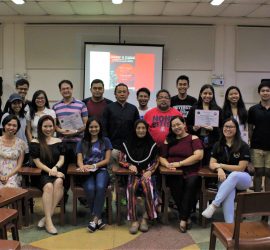“The greatest cost of the siege is our identity.” This has been emphasized by Prof. Dalumabi Lao Bula, retired professor of Social Science and Humanities in Mindanao State University, over the stretch of the forum entitled “Karanasan sa Karahasan: Pagbabahagi ng mga Personal na Danas sa Batas Militar at Karahasan sa Mindanao.” The said forum was organized by the National Service Training Program (NSTP) Diliman Office, in cooperation with the College of Social Work and Community Development and College of Social Sciences and Philosophy – NSTP. The forum was held on September 27-28,2018 at Palma Hall 400, University of the Philippines Diliman. Prof. Bula further added that their identities as “Maranao,” which means “People of the Lake,” is centered upon the Lake Lanao whose richness of depths provide water, livelihood, transportation and electricity to the inhabitants of its shores. More than the vital role of the Lake in the daily lives of the locals, it greatly shaped the culture and history of Maranaos. Since Marawi’s liberation, Prof. Bula informed the audience that no debris cleaning has been conducted in the ground zero. There are plans to transform the area into a metropolis and build military camps, but these plans failed to include rehabilitation for private citizens whose families and properties have been greatly damaged by the conflict. Currently, she estimated that around 20 percent of the affected families remain in evacuation centers while the remaining 80 percent are either renting a place or residing with relatives. Since the end of the Marawi siege, its residents remain barred from entering the most affected barangays while actors were allowed to shoot some of their movie scenes in the area. According to Prof. Bula, this systematic forced displacement of Maranaos from their homes is a violation of their human rights. As a result, they were not able to practice some of their most honored traditions as Muslims. They were not allowed to look for nor bury their dead. Neither call to prayer nor feasts have been held to celebrate the end of Ramadan in their homes. As an internally displaced person herself, Prof […]
Monthly Archives: September 2018
1 post

